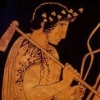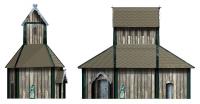Leaderboard
Popular Content
Showing content with the highest reputation on 2014-09-20 in all areas
-
Hey, I just posted some additions and changes to the audio voice list on the the corresponding thread. I was actually the one to submit the phrases in English, Ancient Greek, transliteration, and International Phonetic Alphabet. That was quite a while ago; not sure how long. I never finished the job back then; I guess it seemed too overwhelming to me then. But today I came back to it and got most of the phrases translated. Nicolas, I listened to your recordings and have some input. (I studied Attic and Homeric Greek and researched the pronunciation on the side, so this is from my personal experience practicing the pronunciation.) There are three characteristics of Ancient Greek that are difficult for English speakers: vowel length, aspiration and voicing distinctions, and pitch accent. These are some areas where your pronunciations could use work. Or at least vowel length and pitch accent. I'm not sure about the aspiration thing, because it's hard to hear in the recordings. Ancient Greek, unlike English, has vowel length distinctions everywhere in a word. In English, long vowels usually occur in stressed syllables; lengthening of a vowel is part of what indicates stress in English. To an English speaker, Ancient Greek will sound like it doesn't have regular stress, because stress is marked only by pitch, not by lengthening vowel of the the stressed syllable and shortening and reducing the vowels of unstressed syllables. Some of your audio files need work in this area, such as γεωργήσω "I will farm". (I thought νέμω "I am herding" needed work, but then I thought I could hear a little length in the o.) There's also the pitch accent. Ancient Greek had a pitch accent, unlike Modern Greek, which has a stress accent (hence the removal of the grave and circumflex accents from the Modern Greek alphabet). Pitch accent is usually placed on one mora in a word. A mora is a short-vowel unit. Long vowels and most diphthongs have two morae. There are four possibilities for accent: no accent, high pitch on one morae, high pitch on first of two morae, high pitch on last of two morae. These can be notated as à, á, áà, àá. (Here à, grave accent, represents no accent or medium pitch.) áà is equivalent to â, the circumflex: thus, the circumflex is a falling accent. àá is equivalent to acute accent on a long vowel or on the last vowel of a diphthong, as in ἁλιεύσω. We don't know exactly how pitch was (or what the grave accent was like), but I like to pronounce it as a gentle hill, with the high-pitch mora as the top of the hill. The difference between the highest and lowest pitches, or the high pitch and medium pitch, is supposed to have been about the musical interval of a fifth. I've noted the pitches in the IPA using acute accent (high pitch on single mora), circumflex (high pitch on first of two morae), and caron or háček (high pitch on last of two morae). I also added this to the Wikipedia page on IPA for Greek. Finally, there was a three-way distinction in voicing and aspiration in Ancient Greek. We have a two-way distinction in English. Ancient Greek had voiceless unaspirated (p, t, k), voiced (b, d, g), and voiceless aspirated (ph, th, kh). I think you tried to capture this in the two audio files with aspirated consonants. At the very least, you're not pronouncing it the Modern Greek way. The distinction is hard to capture because English has a simple distinction of voiced and voiceless, and voiceless is often accompanied by aspiration, and voiced by lack of aspiration. Both unaspirated p, t, k and voiced b, d, g can sound voiced to an English speaker. It was hard for me to properly make the distinction when I was trying to pronounce Ancient Greek, and still is. Maybe it would be easy for a Hindi speaker to make the distinction. Anyway, those are my thoughts. Curious how much of this you already are aware of, because you do seem to know the differences between Ancient and Modern Greek pretty well, based on the several sound files I listened to.3 points
-
Hey, guys. I contributed to the audio voice list for Ancient Greek a while back (not sure how long ago exactly), but never finished the job. You can tell where I left off; that's where the list reverts to just English and Greek in transliteration with accents marked by graves. Here's the remainder of the phrases, with transliteration and IPA. I used the Liddell and Scott lexicon of Ancient Greek (http://www.tlg.uci.edu/lsj/) to search for the best word in each case. I've significantly expanded the number of the phrases in cases where the Ancient Greek seems to have unit-specific words. If the game engine doesn't allow for this specificity (I don't know anything about programming myself), I can try to merge some of the phrases, like making the attack phrases be the same for all units. I will repair — ἐπισκευάσω — episkeuā´sō — [episkeu̯ǎːsoː]I will heal or repair — ἀκοῦμαι — akoûmai — [akûːmai̯] (or ἀκέσομαι?)I will heal — ἰάσομαι — iā´somai — [iǎːsomai̯]I will hunt — θηράσω — thērā´sō — [tʰeːrǎːsoː]I will go — εἶμι — eîmi — [îːmi]I will go into (a building; see below for entering a ship) — εἴσειμι — eíseimi — [ǐːsiːmi]I will fight (of any unit) — μαχοῦμαι — makhoûmai — [makʰûːmai̯] (or μαχήσομαι or μαχέσομαι?)I will ride (of mounted units) or steer (of ships) — ἐλῶ — elô — [elôː] (or ἐλάσω?)I will ride against (attack of mounted units) or attack (of ships) — ἀντελῶ — antelô — [antelôː]I will go out (marching of land units) — ἔξειμι — ékseimi — [éksiːmi]I will step up or go on board (of land units entering a ship) — ἀναβήσομαι — anabḗsomai — [anaběːsomai̯]I will step off or disembark (of land units exiting a ship) — ἀποβήσομαι — apobḗsomai — [apoběːsomai̯]I will go against (attack of land units) — ἔπειμι — épeimi — [épiːmi]I will go back (retreat of land units) — ἄπειμι — ápeimi — [ápiːmi]I will sail (of any ship) — πλεύσομαι — pleúsomai — [pleǔ̯somai̯]I will be led or go against (attack of warship) — ἀντανάξομαι — antanáksomai — [antanáksomai̯]I will sail against (attack of warship) — ἐπιπλεύσομαι — epipleúsomai — [epipleǔ̯somai̯]Let me know if this list will work as a replacement and addition to the current audio voice list, and if there are any changes or additions to make. Also, any questions regarding the words I chose are welcome.I also need to give some instruction to the person who's going to record these phrases, but that's for the other thread.2 points
-
1 point
-
The developer overlay is for everything that might be useful for development, but isn't fitting in ordinary gameplay/the gameplay experience. So it definitely belongs there.1 point
-
1 point
-
Hello Erutuon, and thanks a lot for the input on this! I'm French so I'm not a native English speaker at all, I'm quite surprised you thought I was, because I don't see how I would pronounce Greek with an English accent I'm actually aware of all this, and I didn't try, indeed, to add the pitch accents, because I'm not used to pronounce them and I was afraid they would remove some authenticity because of my lack of practice I'll try to improve the recordings that way. I'll also try to insist on the vowels length, this time the problem was the pace. My first attempts were really slow and boring to hear and I put the vowels length a bit aside, I'll see what I can do. Finally, about aspiration, I did try to capture it but it's hard to ear it in the recording, and too much aspiration is bad for the sound quality... I'll come back with new recordings when the work on the new 0AD release is behind us, I'm also commenting on the other thread, thanks again for your professional advice!1 point
-
It's a free, open-source project - funded by donations, developed mostly by volunteers. No way to know how much time people will have to work on it, or even how many will be working on it. It looks like it's getting fairly close, but not much more you can say. The main reason for playing now is to help with the development process as a tester - finding bugs, suggesting improvements, etc., which provides its own kind of satisfaction. If you're not into that, that's cool - to each his own. It's a good game even at this stage, though.1 point
-
Some suggestions: 1) Cancel fortesses and towers number limit Never knew why the number of fortresses is limited to 10 and can't think of a good explanation. Maybe it is time to reconsider? 2) Autopause when a player leaves an MP game (as an option) When a player suddenly leaves a game, a common courtesy is to pause and wait for him for a while. Would be nice to have an option for autopause if a player left not through menu but because of a crash or connection issue. Should be unpausable from menu. 3) Do not allow warships/heavy wasrships in shallow waters Military ships in oases are a joke. If there is a way to know max depth of waters in a basin where a dock is, would be nice to disable warships/heavy warships building for depths less than some value. 4) Giving a rotary mill a functionality of a farmstead (so that workers can drop resources there) 5) Changing alert bell functionality Now, increasing the alert level is mostly useless option: normally, after an initial alert a CC and towers garrisoned with women, and this is pointless to hide citizen soldiers in houses, better to make them fight. I would suggest at least not let women to hide in towers on alert (or maybe give houses a priority to towers), so that after an alert level increase ranged inf could get there. Another idea is to replace an alert level increase feature with an independent alert for ranged troops, calling them to garrison in CC/towers/forts. 6) Remove player number tips from the map sizes control (eg make it just "Small" instead of "Small (2 players)" ) What we have now, leads to stereotypical thinking. In practice, an 'open' Medium map can be just perfect for 4 players game. This also depends on a game type: if you play 2v2 or 3v3 on a large map, this is ok; if you play all-vs-all, this can just become boring when only two stay alive. 7) "Shared" pop cap for locked teams, as an option A bit crazy, but... In 2v2, after one of the enemies is killed, it is normally won, not because it becomes 2v1, but because it eventually becomes "600v300". What if pop cap could be set per team, depending on initial number of players? 8) Disable teamchat for defeated players, so that they couldn't secretly give hints to their teammates, seeing a revealed map 9) Make foundations of health 1 (placed, but not being constructed yet) not visible to enemies1 point





